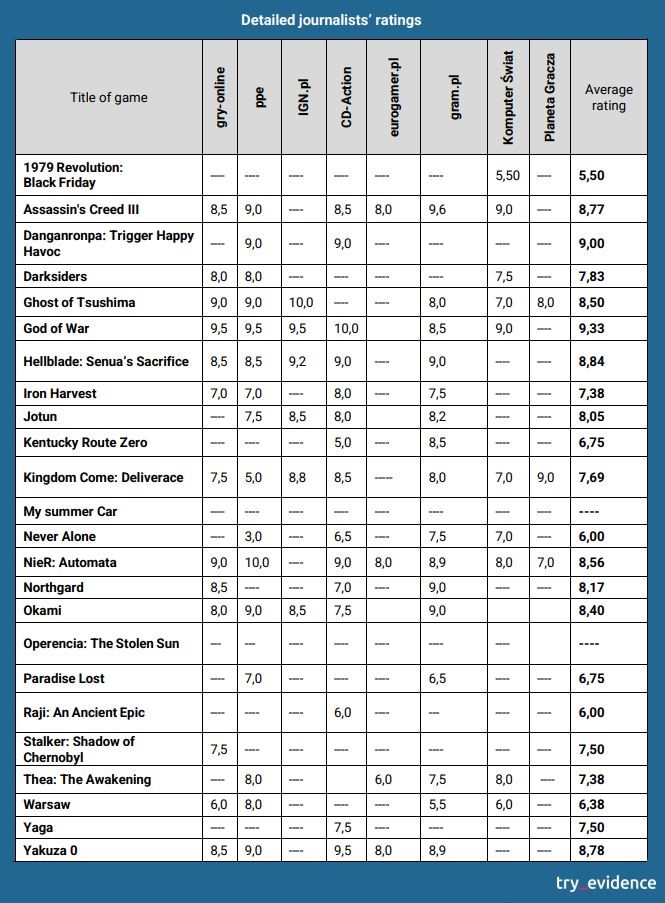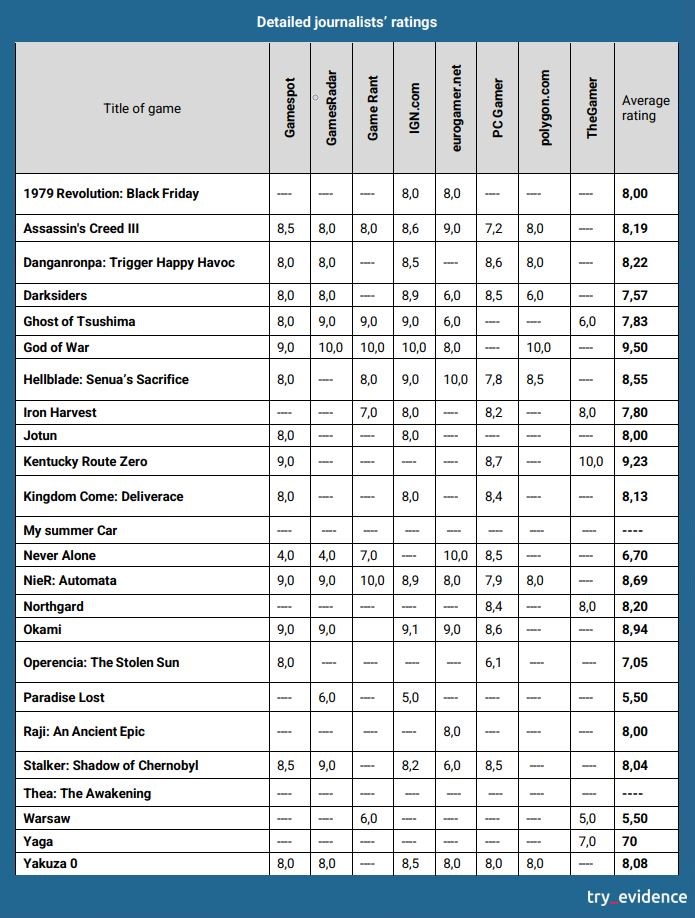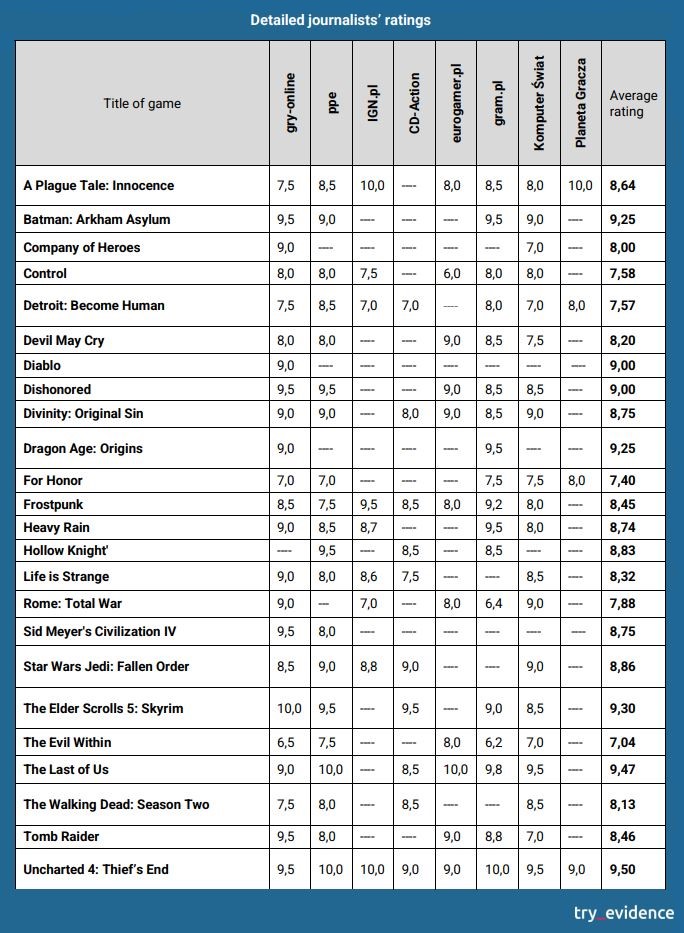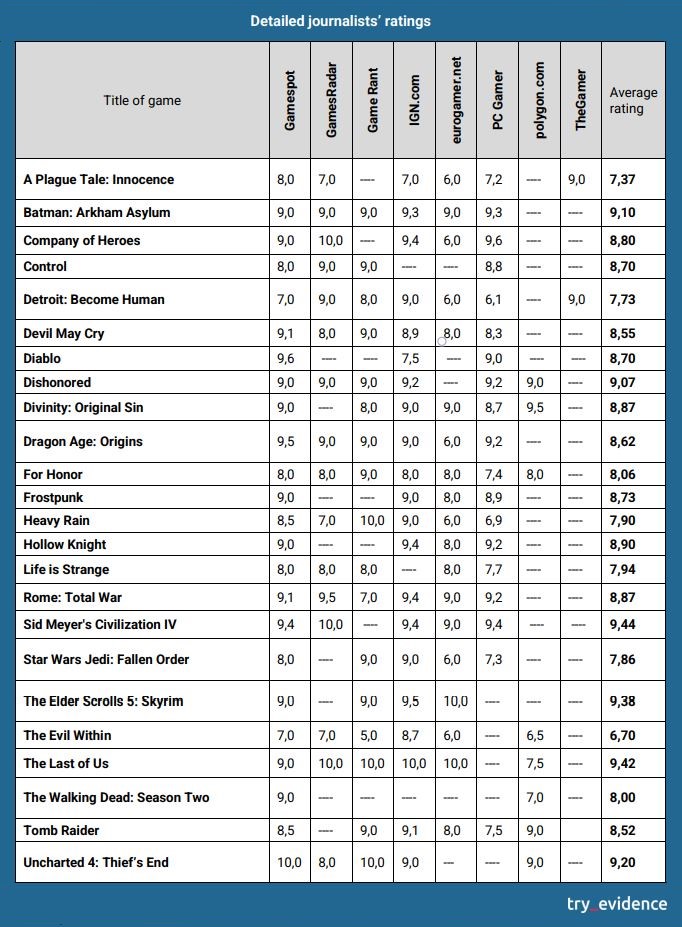Do Polish Journalists Rate Games Differently Than Foreign Ones?
- September 24, 2021
- Try Evidence Research Team

When researching our clients’ games, we collaborate not only with gamers but also with gaming journalists from Poland and abroad. Developers and publishers often ask to what extent Polish voices reflect global perspectives on a game’s reception and success in the international market. With this in mind, we recently analyzed whether Polish gamers’ evaluations differ from those of players worldwide. This time, we focused on gaming journalists. We wanted to explore whether Polish experts’ opinions align with or differ from those of their international counterparts.
One of the primary services provided by Try Evidence involves silent reviews, also known as mock reviews. Experienced gaming journalists are selected based on their expertise in specific genres or niches. They receive a build of the game at any stage of production to play and review. Then, they write their assessments as if for a gaming publication. That includes sharing their opinions on selected aspects of the game and often suggest potential improvements as well. Unsurprisingly, it is very important to developers that the journalists chosen for collaboration are “representative” of gaming experts. This is similar to the way players selected for playtesting are chosen to represent the broader gaming community.
Just like we did with Polish gamers, we examined whether Polish journalists assess games similarly to their global counterparts. Perhaps their evaluations differ due to cultural factors specific to their environment?
How We Conducted Our Research
For each selected game, we gathered ratings from the 8 most popular global and Polish gaming media. We calculated the averages and compared them using a statistical test. This helped us determine if Polish journalists’ ratings differed from those of their international peers. However, in many cases, we couldn’t gather a full set of 16 ratings, as some outlets didn’t provide numerical scores for the games we selected.
Average Ratings for Culturally Dependent Games
Game Ratings by Polish Journalists
Game Ratings by Global Journalists
Average Ratings for Culturally Independent Games
Game Ratings by Polish Journalists
Game Ratings by Global Journalists
Research Findings
Results
As with our study of players, our analysis showed that
Polish journalists’ ratings generally do not significantly differ* from those of foreign journalists, both for culturally dependent and independent games.
The difference in ratings (on a scale from 0 to 10) between Polish and foreign journalists averaged 0.76 points for culturally dependent games and 0.45 points for culturally independent games.
This suggests that
Polish gaming journalists evaluate games in much the same way as their international counterparts.
To be more specific: it’s highly likely that Polish and foreign journalists’ overall assessments of games are not significantly different. This doesn’t mean that differences won’t arise for certain titles. However, when they do, they are more of an exception than a consistent trend—Polish journalists aren’t “different” from their global peers.
Games with the Biggest Rating Differences – Polish vs. Global Journalists’ Opinions
Among the titles we researched, there were several where the difference between the average rating of Polish journalists and that of foreign journalists exceeded 1 point on a scale from 0 to 10. This is a noticeable difference. These included four culturally dependent games and three culturally independent games. We decided to take a closer look at these titles and explore what might account for these differences.

Rating Differences in Culturally Dependent Games
1979 Revolution: Black Friday (iNK Stories)
This game is a niche, lesser-known, and ambitious title. Its Polish rating is 2.5 points lower than the global rating. However, it’s important to note that for the media outlets we selected, we found only one Polish review and two foreign ones. This small sample size could explain the large rating difference, making it hard to draw definitive conclusions.
The Polish review highlighted several flaws, including technical issues, uninteresting characters, a poorly written script, unattractive models for minor characters, and inconsequential choices. On the positive side, the reviewer praised the filmmaking, sound design, and the game’s focus on the 1979 Islamic Revolution, which led to the overthrow of Iran’s Mohammad Reza Pahlavi.
Interestingly, the two foreign reviewers also mentioned problems with the visuals and illusory choices. However, they placed more emphasis on the story and the relevant historical subject matter. One reviewer, an Iranian, even described the game as refreshing, intelligent, and rich in educational value due to its focus on the 1979 revolution.
Based on this, we believe that the game’s theme was rated more favorably by those who felt a closer cultural connection to it.
Kentucky Route Zero (Cardboard Computer)
For this title, we found two Polish and three global ratings. The average Polish rating being 2.48 points lower than the global rating. Again, this could be due to the small sample size, so it’s hard to draw any definitive conclusions about a general trend.
Both Polish and foreign reviews praised the well-written dialogues, the interesting format, the surrealist elements, cultural references, graphics, and music. However, the Polish reviewer, who rated Kentucky Route Zero lower than the others, criticized the game for its outdated mechanics, slow pacing, and a plot that seemed incompatible with the video game medium.
Paradise Lost (PolyAmorous)
Raji: An Ancient Epic (Nodding Heads Games)
For this niche production, we have only one Polish and one global review, with the Polish rating being 2 points lower. The sample size is too small to draw any conclusions about a general trend.
Both the Polish and foreign reviews praised the game’s interesting and original subject matter, based on Hindu mythology. The Polish reviewer also highlighted some flaws, such as unsatisfying combat and overly easy platformer elements.

Rating Differences in Culturally Independent Games
Star Wars Jedi: Fallen Order (Respawn Entertainment)
Star Wars Jedi: Fallen Order received an average rating 1 point higher from Polish journalists. They primarily praised the satisfying gameplay and combat, the well-designed open world, and the interesting story. They also appreciated how the game expands the Star Wars universe.
Foreign journalists shared similar praise for these aspects but rated the game lower due to technical issues, a problematic frame rate, distant checkpoints, and slow story development.
Control (Remedy Entertainment)
On average, Polish journalists rated Control 1.12 points lower than foreign journalists. Polish reviewers, unlike their international counterparts, more frequently highlighted the game’s issues. These included uninteresting characters, an unengaging plot, poorly balanced difficulty, and an inadequately designed checkpoint system.
A Plague Tale: Innocence (Asobo Studio)
Polish journalists rated the game 1.28 points higher on average than foreign experts. Both Polish and foreign reviewers pointed out similar flaws. These included repetitive gameplay, low difficulty, one-dimensional antagonists, and shallow relationships between the protagonists. On the positive side, their praise was also similar. Both groups highlighted the atmosphere, the lore, and the well-written, exciting plot.
Summary
Polish gamers and journalists do not show a clear, systematic difference in how they evaluate games compared to their international counterparts. We believe that cultural identity and country-specific factors do not significantly influence game evaluations in general. Certain games, deeply rooted in a specific culture, might be judged differently by journalists and gamers from various countries. However, there don’t appear to be clear patterns or consistent rules in this regard. Such differences are unlikely to be widespread. Based on an analysis of individual title reviews, it’s clear that Polish and foreign journalists give similar numerical ratings. They also highlight similar aspects in their reviews.
_____________
* Statistical significance refers to the idea that a result observed in data from testing or experimentation is unlikely to have occurred randomly or by chance. Instead, it suggests that the result is more likely due to a specific cause. Therefore, when we compare results and find that the differences are statistically insignificant, it means that the differences in the absolute scores between the groups studied have no practical relevance.










